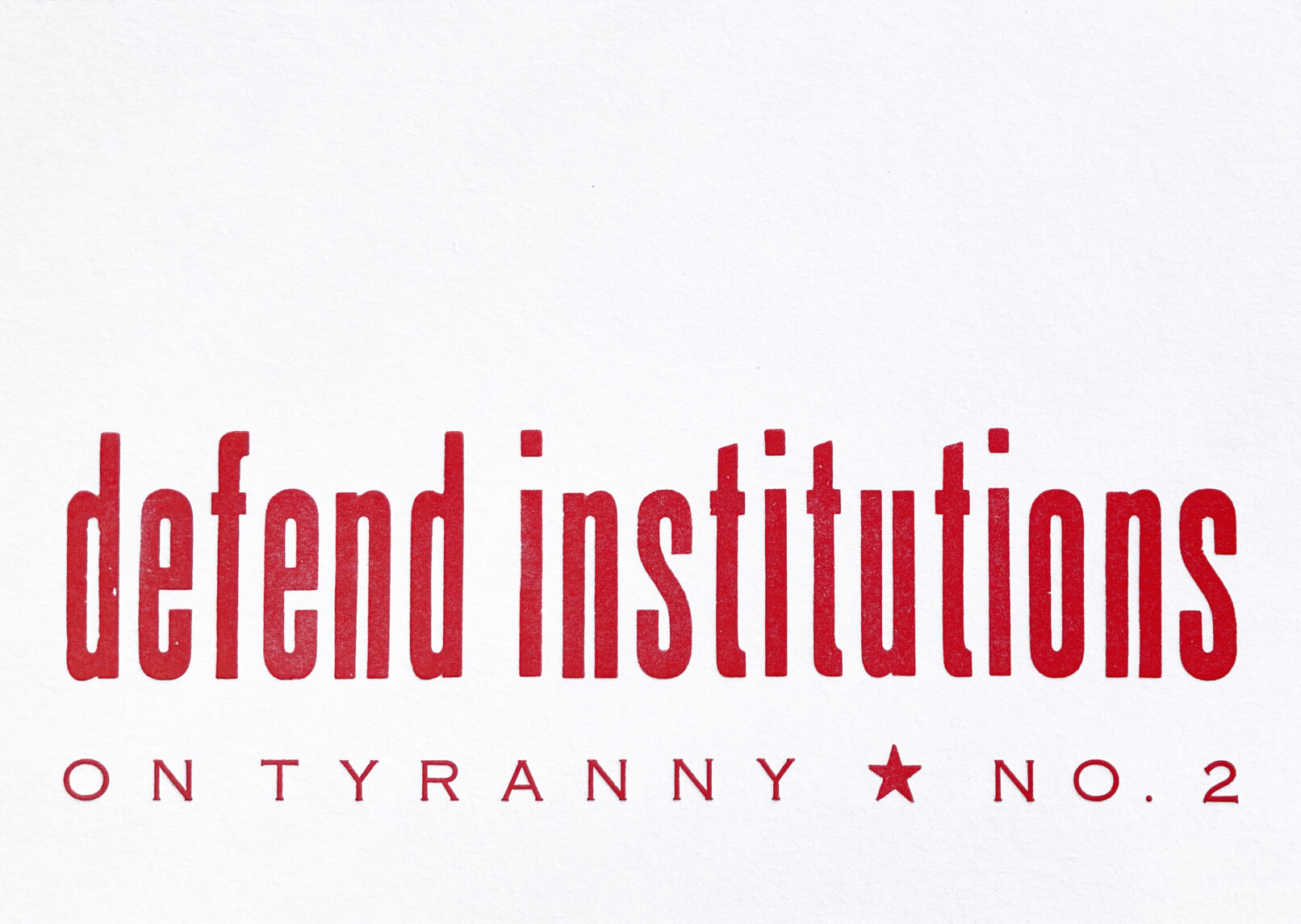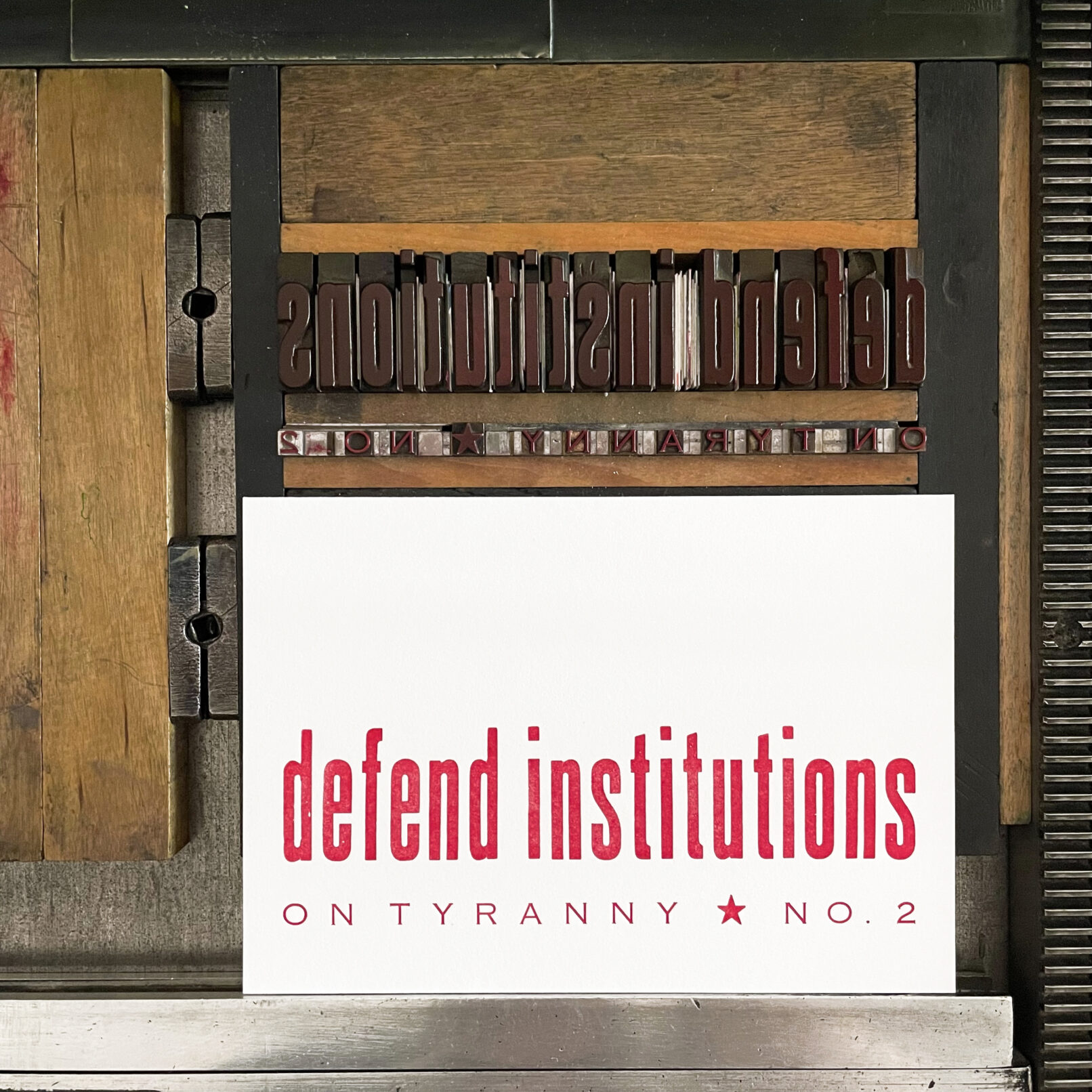“It is institutions that help us preserve decency. They need our help as well. Do not speak of ‘our institutions’ unless you make them yours by acting on their behalf.”
–Timothy Snyder, On Tyranny
When Snyder refers to institutions he means both large institutions like democracy–which we might remind ourselves is the spreading of power among the many instead of among the few—and also smaller institutions like courts, a law, a newspaper, or labor unions.
Institutions are protected or destroyed by people. Without people to uphold the institutions, they crumble. As a recent ransomware attack on the Seattle Public Library demonstrated, institutions do not defend themselves. They are run by people, and people can be corrupted, misled–or just make mistakes.
In On Tyranny, Snyder refers to institutions both large and small when he argues that “the mistake is to assume that rulers who came to power through institutions cannot change or destroy those very institutions (24).” This is the very thing that Trump and the insurrectionists of January 6, 2021 were attempting, and very nearly accomplished, when they stormed the US Capitol while Congress was certifying the results of the presidential election. The claim by the insurrectionists that elections are only valid when their own picks are elected is a bid to make themselves the institution.
In a recent Substack essay, Snyder talked about this issue in terms of the idea of “respecting the equipment” (a reference to a sign he saw in a gym while attending a kindergarten graduation). He wrote: “the equipment of peaceful daily life is the law. The Constitution governs how a president leaves office, so that we don’t have to improvise and fight about it each time. [. . .] We won’t always like how elections or trials turn out. But it’s a mistake to break the equipment, especially when you are meant to be its custodian. [. . .] To ‘lose without blaming’ and to ‘respect the equipment’ means thinking of others. No contest is just about the individual. It is about keeping something going, something that we can make better. If the equipment is just there for me, then I might think I have every right to destroy [it]. But the equipment is only there because others assembled it for me. So it is my job to leave it in better shape than I found it. [. . .] Some people never learned the lessons they should have learned in kindergarten.”
We do think it’s important to acknowledge that many US institutions are grounded in white supremacist ideals and are in need of repair (and sometimes even complete overhaul). The double speak or simulacrum of what one says and what one actually means is a founding principle of the United States, which is founded on stolen land and stolen labor while espousing freedom. The work to “defend institutions,” then, would be work to strengthen and revise them to protect all people’s freedom, not just the freedom of those in power. This is how we “leave [the equipment] in better shape” than we found it.
Snyder urges us to choose an institution to support. In his YouTube video about this tenet (link below), he explains that you know you are making a difference in the support of institutions when 1) you do something regularly for that institution, 2) you do something in a field in which you have some knowledge (though we think an interest and willingness to learn is enough), 3) you do it with other people (i.e. in community), and 4) you repeatedly act in the interests of that institution, over and over again.
We are more likely to invest our time and energy in institutions when we see our values reflected there. Whether you care most about reproductive rights, racial justice, climate crisis, LGBTQIA2S+ rights, disability rights, war, healthcare, education, gun control, or any other of the myriad issues we face, find an institution or law connected to that issue, and take steps to defend, strengthen, improve, or fortify it.
Again borrowing from Omkari Williams’ Micro Activism, however: don’t try to do too much and spread yourself too thin. You are more effective if you choose one, and at most two, issues/institutions to support.
We love the work The Portland Stamp Company has done to defend the postal service–creating “Dump DeJoy” stamps and encouraging activism toward that end (along with Bernie Sanders and other Senators who are working on that front as well). In Seattle, Wa Na Wari has an amazing program where regular monthly donors receive a monthly piece of mail art made by Black artists in the community (participating would support the postal service and Black creative institutions). Postcards to Voters and Vote Forward are both great organizations that support the postal service (and voter turnout).
Democracy, the largest “institution” of them all, requires support as well. The easiest way we can support it is by voting in every election and by protecting others’ right to vote.
A few more resources in that vein:
Hear Timothy Snyder speak about this tenet on YouTube.
This lesson was letterpress printed in Pantone 199 ink on a Vandercook proofing press.

